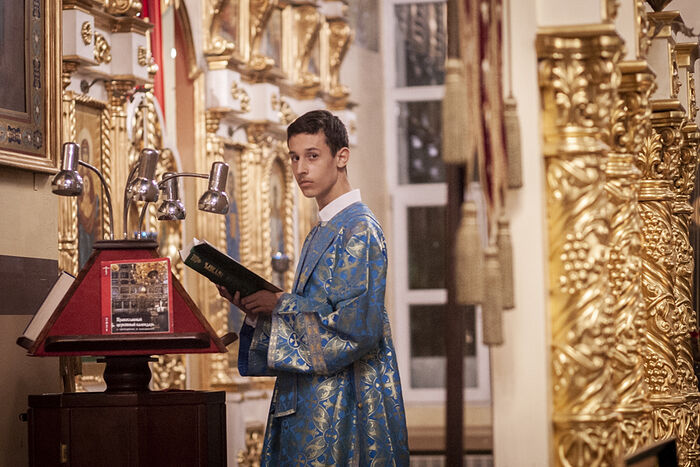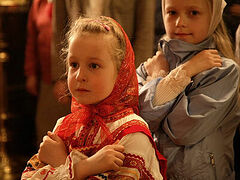It is no longer a secret to anyone that some children who were brought up in religious families drift away from church in their teens, while some others abandon the Church altogether, quite often for the remainder of their lives. Is there any way to avoid this? What is the measure of parental responsibility for the choice of faith that children make? We spoke about this with Archpriest Maxim Pervozvansky.
 —Fr. Maxim, why, in your opinion, does this problem arise on the whole?
—Fr. Maxim, why, in your opinion, does this problem arise on the whole?
—The problem is that a small child adopts the values embraced by his parents. The parental outlook on life becomes the outlook of their children. It is the same about God and the Church, too. But the teenagers are at that stage in life when they begin to develop their personal attitude to life. They review and reassess many things that, during their childhood years, were accepted without any evaluation simply because their parents have told them so.
A subject of religious identity is one of the most pivotal factors in human life.
We can’t simply screw our own heads onto our children’s shoulders. As they continue to mature, they will determine on their own their attitude towards God, and it is not always going to happen according to their parents’ liking. We can’t forget that the fundamental principle of human life is freedom.
But it is also true that the way the children are brought up will leave an imprint on their future choices. Because all of us carry both the positive and the negative beginnings. Whichever takes root will depend on ourselves and the baggage we carry on in our life. It concerns not only the religious identity, but also the life in general. If a girl’s mother got divorced and now hates all men, it will surely be passed to on her daughter. We can’t say that her daughter would necessarily treat all men in the same fashion. But it will give off a certain vibe. The same goes for the religious life—the upbringing provided by the parents sets a certain tone. But later on, man will define his position on his own. Otherwise, there would have never been any personal responsibility.
—Can we somehow prepare ourselves for that stage in our children’s lives, so that it could pass painlessly?
—There is a principle of upbringing included in the Holy Scripture: “Shun evil and do good; Seek peace and pursue it” (Psalm 33:15). Every pious parent tries to protect their child from any serious temptations and have his soul nourished by positive impressions and prayer. But we live in a secular, not a religious country and we’ve got no universally binding religion, obligatory for all. That’s why, if a child is completely isolated from secular life, it will keep beckoning him in with its shiny bright lights; but if you set him free, he will be instantly lured in. Thus, we should implement some kind of a teaching genius, or intuition, to help us determine what we can do, and what we can’t. Moreover, every child needs an individual approach.
We can’t fully isolate our children from all influences, including mass culture. The parents should act as guides to their child as he grows up. And the most important thing they can do is to maintain credibility in the eyes of their children. If the children aren’t alienated from parents during their teen years, that is already half the battle won. Sure enough, a child develops his self-identity knowing that he is different from his parents. But, when they start to hate and despise everything that has to do with their parents, this nihilism will naturally spill over the subject of faith, as well.
Without a doubt, we must maintain contact with children so that they are willing to listen to what their parents say. And vice versa—we must put ourselves into our children’s place and avoid the moralistic approach of looking down at them, but rather act as their more experienced friends.
—Still, we have examples when the teenagers stay in church. What, in your opinion, helps them to stay?
—There are a few factors, with Divine Providence being a major one. God chooses and calls people. There is no way we can somehow influence this calling. The second factor is man’s free will. And lastly, it is everything else, including the parental or parochial traditions.
Certainly, this is easier to do for a child in an active parish teeming with activities for young kids and adolescents. The child won’t struggle as much if has Orthodox friends with whom he is involved in Orthodox projects. However, if his self-identity in matters of faith isn’t driven by his own personal choices but owing to certain external factors instead, we simply push back his decision-making for later in life. I have a friend, a mother with two children, and she is going through a serious withdrawal stage, which includes the issue of religious self-identity among others. However, she never had any identity crises before she turned thirty.
 Besides, this problem of personal identity may arise not once during our life. We are no angels, and we can repent, but we can also fall down. Why for example do elderly people suddenly become churchgoers? It isn’t because they’ve got nothing else to do, as younger folks may assume. They are there exactly because one of the personal identity crises strikes those who are soon to retire or who already retired. Actually, I know many people who, on the contrary, quit going to church in old age.
Besides, this problem of personal identity may arise not once during our life. We are no angels, and we can repent, but we can also fall down. Why for example do elderly people suddenly become churchgoers? It isn’t because they’ve got nothing else to do, as younger folks may assume. They are there exactly because one of the personal identity crises strikes those who are soon to retire or who already retired. Actually, I know many people who, on the contrary, quit going to church in old age.
—Tell us please about the Orthodox youth association called “Young Rus’.”
—It is one of the oldest youth organizations in Moscow, existing since 2001. Its membership has changed many times, and we have witnessed the change of generations. It attests to the fact that this format of a youth organization is in high demand. Besides, the participants didn’t come to “Young Rus’” fresh out of church schools. It so happened that its youngest participants are aged twenty-two or twenty-three, and often even twenty-five. So, on the average we are talking about college or university graduates.
Why does this happen? I think that these young people get enough socialization while they study at the university. However, if a young person doesn’t get married by the time he graduates, he develops a need to socialize with the same-age peers. Such communication, and that also includes educational activities, as well as charitable causes, can be found under the auspices of “Young Rus’.”
Unfortunately, over the last few years, we see a growing trend when fewer people attend our charitable campaigns rather than, say, a festival. To the contrary, in the mid-2000s, we witnessed a peak of social work activity. We had around seven groups of twenty people each who assisted at several hospitals and a few children’s homes. And this wasn’t because we handed down such an assignment to them; no, we simply had so many volunteers willing to help. But later on, their numbers sharply declined.
—What do you think has caused it?
—You see, the children’s homes in and around Moscow are fully stocked, in terms of supplies. There is no longer any urgent need for help. But people will always be more eager to help if there is a compelling need. Whenever life gets more or less comfortable, there usually arises a need to offer a more targeted, professional support. At the same time, the requirements for those visiting children’s homes have also gotten stricter.
—There is a widespread opinion among older people that today’s younger generation isn’t interested in anything…
—Well, you know, it’s always been like that. Whatever era you take, the older people always thought the young people weren’t the same as they were before. I usually explain it to myself this way: It is quite hard to part with this world; and in order not to feel too regretful about it, they begin to console themselves: “But there is practically nothing good left in this world after me!”
In all times there were those who weren’t interested in anything, as well the mean-spirited; but were also great enthusiasts, people truly involved and greatly engaged. Another thing is that the ideas driving the young people’s interests have evolved and the forms those ideas are taking on have changed, too. This is what doesn’t necessarily align with what seems right to the older generation.
—How can the older generation harmonize this communication? Should they research the ideas that young people find exciting?
—I don’t think it would be right to search for answers or make things up. If you are an interesting person and stand for something, others will be willing to communicate with you, including the younger people.
Overall, the problem of fathers and children described long ago by the famous author Ivan Turgenev[1] was about something else. It is when fathers no longer want anything, but their children are seeking answers. Youth is always overzealous by nature, and leave no place for nuance. As they grow older, or reach senior years, people begin to worry more about a cozy bathroom, peace of mind, or a full stomach. Surely, this isn’t good enough for young people, as they think like the saying goes: If you think of marrying—then find a queen; if you do rob a bank —then grab a million. As for middle-aged people, it is natural for them to seek compromises.
This also concerns church life. We have lived long enough and know full well that these things can’t be done thoughtlessly; we are willing to compromise, including with ourselves and our conscience. And this isn’t always synonymous with either good or bad. It’s just that, so to speak, to each age its own.
—What would you wish for parents and teachers: How can they help their children remain in church?
—You should keep interested in life and all its manifestations, be it concerning the things within the Church or the world around us. Plus you should try hard to live the life of a Christian, doing what is really important for you. Then, your children will also be inspired by the same things.





